
A dynamic mix of stakeholders from the communities along the Yangtze River and Mississippi River convened at the Yangtze-Mississippi Regional Dialogue on November 15th, 2024 in Memphis. Representatives spanning 17 U.S. states, as well as from Washington D.C., welcomed a historic Chinese delegation of 40 representatives from five localities: Shanghai, Chongqing, Wuhan, Hubei Province, and Jiangxi Province.
The Yangtze River in China and Mississippi River in the U.S. are the most significant inland waterway of their respective countries. Both rivers cross a vast distance touching diverse communities and supporting major industries. Both river basin communities are experiencing similar climate challenges such as drought, flood, pollution, and many more.
Historically, the two river basin communities had some exchanges until the pandemic, but growing geopolitical tension halted all dialogues. In the fall of 2023, as part of the Yangtze-Mississippi Municipality Energy Transition Exchange Project, which the U.S. Heartland China Association (USHCA) launched to promote best practice sharing between the two river basin communities, USHCA organized a historic Heartland Mayors Delegation to China. A key engagement of this delegation in China was the Yangtze-Mississippi Forum hosted by USHCA, East China Normal University and Shanghai People’s Association for Friendship with Foreign Countries on November 7, 2023 in Shanghai.
The 2024 Yangtze-Mississippi Regional Dialogue (YMRD) in Memphis not only carried on the momentum of the 2023 Yangtze-Mississippi Forum by hosting a reciprocal Chinese delegation on the banks of the Mississippi River, but also expanded the scope of the dialogue by bringing together government officials, sustainability experts, industry leaders, and academics to explore collaboration opportunities.
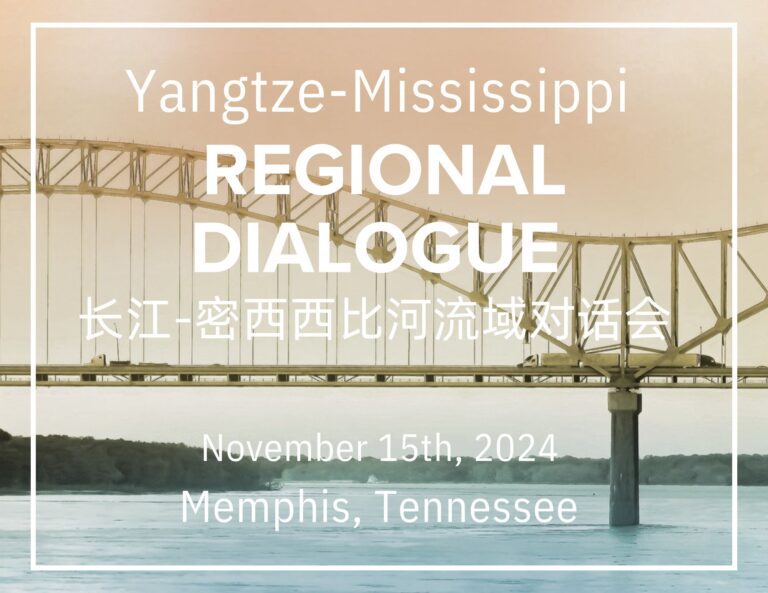
Three separate working groups were convened around climate resilience, low-carbon agriculture, and green transportation. The findings of these working groups underscored the shared challenges across the U.S. and China in these areas, from managing flooding and heat risks for agricultural and climate resilience, to integrating new technologies in transportation. Across the topic areas, representatives from each country saw lessons to learn from the other: innovative projects, established best practices, and smart policies.
Attendees from both river communities applauded the event’s unique, intimate format, which fostered meaningful dialogue, strengthened relationships, and laid the foundation for future exchanges.

On the eve of the Dialogue, participants had the opportunity to attend the Wildlife Conservation and Diplomatic Dialogue Summit, hosted by the Shelby County Mayor’s Office. Professor Elena Songster of Saint Mary’s College of California, a leading expert on panda conservation history, then shared a history of U.S.-China collaboration around panda conservation. Steve Reichling, Director of Conservation at the Memphis Zoo, shared a fond reflection of the Memphis Zoo’s collaboration with Chinese peers over the past twenty plus years around panda conservation and how that had led to the establishment of its now globally-recognized wildlife conservation efforts.
After the formal summit, guests joined a relaxed reception at the Memphis Zoo’s China Exhibit, a venue that perfectly complemented the evening’s theme with its traditional Chinese architecture, complete with a stunning pagoda and lush bamboo gardens.

Later that evening, select guests attended a private dinner; afterwards, participants were treated to an exclusive nighttime tour of the FedEx Global Hub, providing a behind-the-scenes look at how the Fortune 500 company operates its global network.
Yangtze-Mississippi Regional Dialogue at Rhodes College
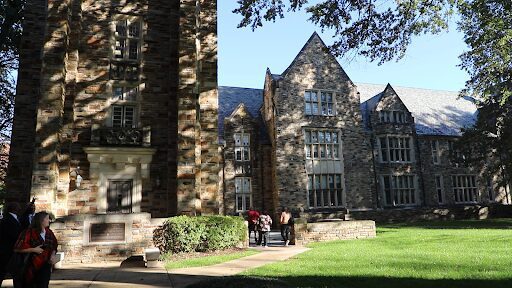
The Yangtze-Mississippi Regional Dialogue was held by USHCA on the campus of Rhodes College.
The dialogue featured remarks from leadership in multiple fields, including; Dr. Jennifer Collins, President of Rhodes College; Susan Thornton, Vice-Chair of USHCA; a written letter from Xie Feng, Ambassador of the People’s Republic of China to the U.S.; Jing Chen, President of the Shanghai People’s Association for Friendship with Foreign Countries.
Additionally, the program included two morning panel discussions exploring critical sectors for both river communities. Participants explored how sustainable practices in agriculture, advancements in green energy, and innovative transportation strategies could drive climate resilience and economic growth.
The first panel focused on “Agriculture & Transportation,” with distinguished panelists: Ted Townsend, President and CEO of the Greater Memphis Chamber, who served as moderator; Liu Hong, Deputy Director-General of the Hubei Provincial Development and Reform Commission; Wally Hsueh, Senior Vice President of FedEx; and John Butler, President of AgriCenter International in Memphis.
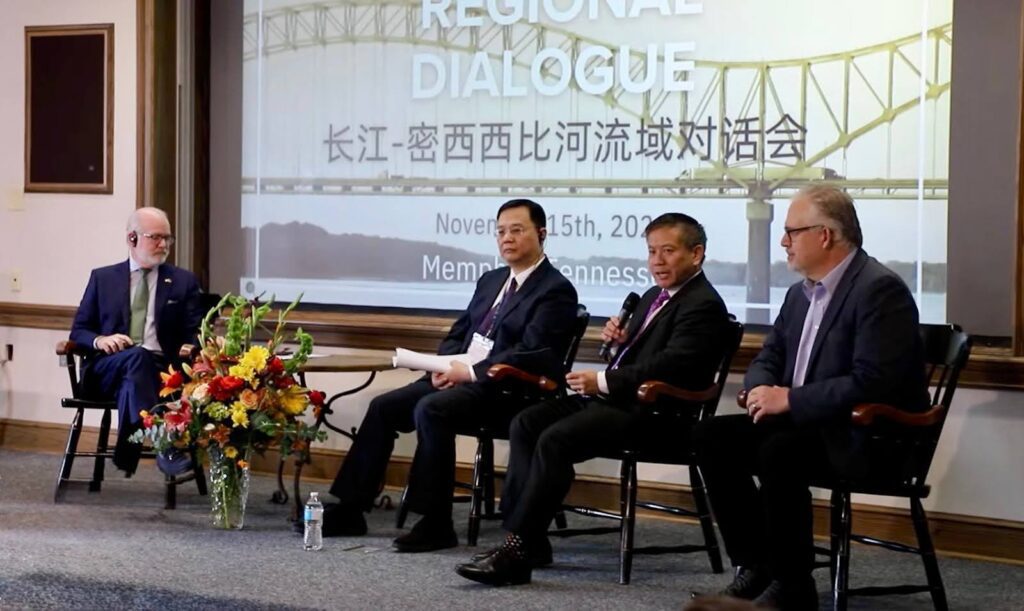
The second panel was organized around “Education & Tourism,” featuring; Katarina Tesarova, Vice President of Sustainability at the Sands Corporation; Chris Heavey, Provost of the University of Nevada Las Vegas; Dr. Brian Waldron, Director of the Center for Applied Earth Science and Engineering at the University of Memphis; Kevin Kane, President and CEO of Memphis Tourism; and Huang Linbing, Director of General Affairs Department at the Hubei Culture and Tourism Group Co., Ltd. Ms. Min Fan, Executive Director of USHCA, served as the moderator.
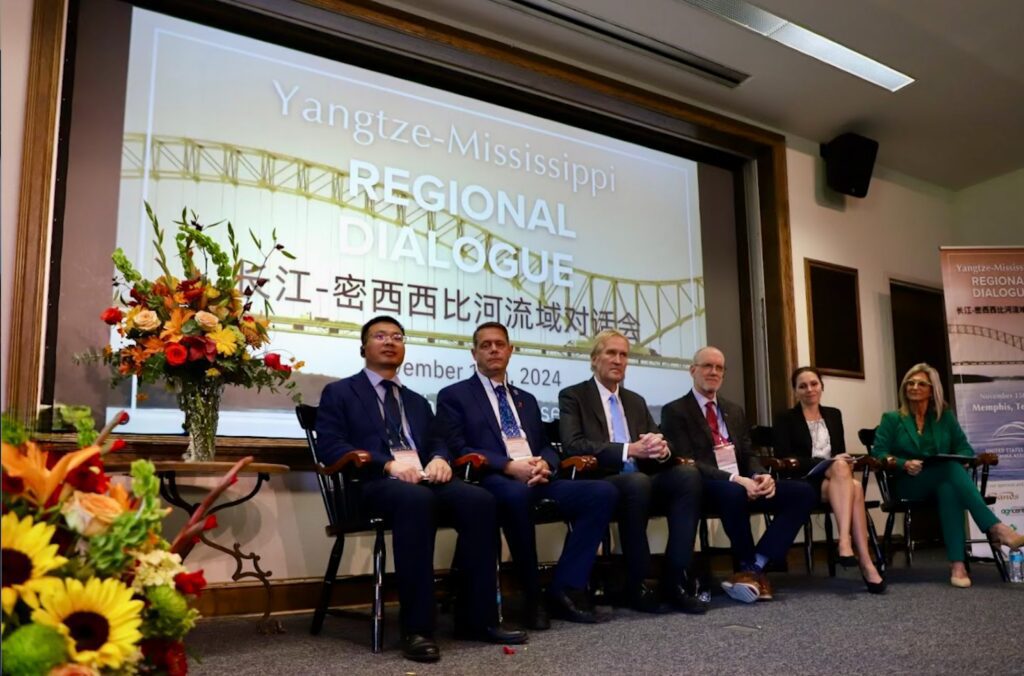
In the afternoon, three expert working groups convened on climate resilience, low-carbon agriculture, and green transportation, engaging in intensive, candid discussions to identify best practices and tangible pathways for bilateral collaboration.
The non-expert attendees had the opportunity to experience Memphis’ rich cultural and historical landscape through curated site visits, including a trip to the beautiful vista at Harahan Bridge, and taking a walk around the scenic, and newly renovated, Tom Lee Park overlooking the Mississippi River.
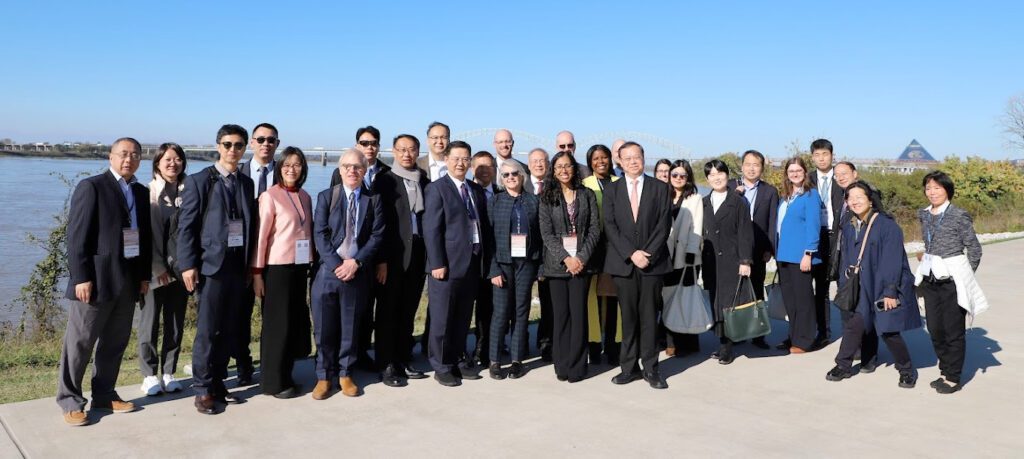
In addition to enjoying the picturesque views along the riverfront, Chinese delegates and visitors from out-of-state also participated in a private tour of the Civil Rights Museum, to learn more about this critical aspect of American history. Afterwards, they visited the local Agricenter International, located in the AgTech Hub of Tennessee, whose mission is to teach locals and international visitors the importance of the agriculture industry in America, while also inspiring the next generation of agriculturalists and scientists to ensure that the Mid-South has a strong and sustainable agricultural sector for the future.
The program culminated in a report-out session, where the working groups shared their key takeaways and outlined next steps for continued engagement. The final panel emphasized future opportunities for Yangtze-Mississippi collaboration, with closing remarks from both USHCA and Chinese leadership.
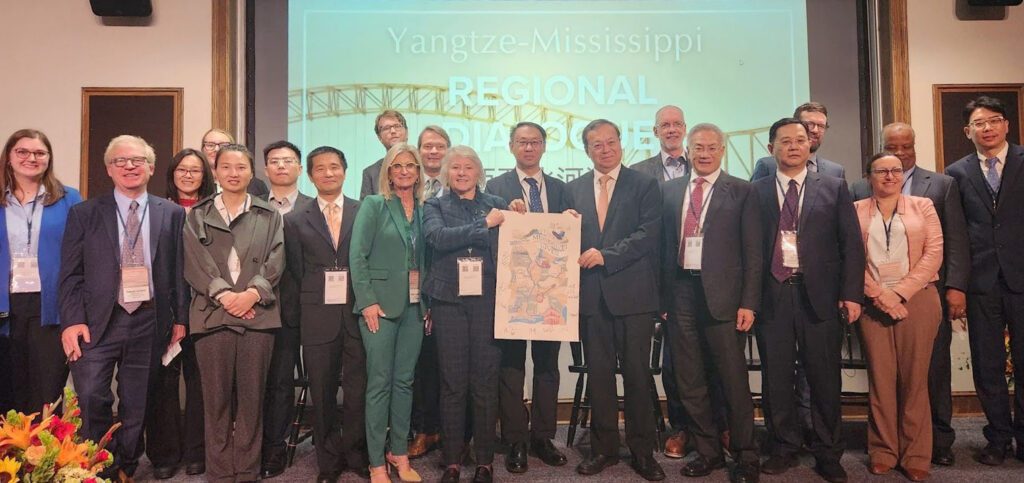
That evening, attendees were treated to a special southern dining experience at Itta Bena, a unique restaurant located in the renovated attic of B.B. King’s Blues Club on iconic Beale Street. Surrounded by the vibrant energy and rich musical history of the area, guests were able to unwind in a more relaxed and informal setting. The evening offered more than just great food and live blues music—it fostered genuine conversation and connection among peers.
Outcomes and Learnings
The overwhelming positive feedback from attendees of the Dialogue not only reaffirmed the importance of subnational partnerships in addressing global challenges, but also showcased the power of people-to-people connections in rebuilding the engagement between the people of the United States and the people of China.
All participants were enthusiastic about future in-person exchanges. The productive working groups and informative site visits showcased the value of “multi-level” exchanges, including both policy leaders and topic-area technical specialists. Future subnational exchanges–including the upcoming 2025 Yangtze-Mississippi Regional Dialogue–should continue to prioritize such mixed groups from both the U.S. and China. Climate-smart agriculture and heat resilience, meanwhile, could be future areas for local pilot projects.
The 2024 Yangtze-Mississippi Regional Dialogue facilitated deeper two-way learning between the U.S. and China due to its prioritization of relationship building. From insightful discussions to meaningful cultural moments—like the memorable visits to the zoo and riverfront—this gathering served as a compelling illustration of how cooperation flourishes when people come together. The American Heartland had a wonderful opportunity to showcase its culture, warmth, and hospitality, alongside its tremendous business potential. It is often in these human moments, beyond formal meetings, where the most positive bonds are formed.

